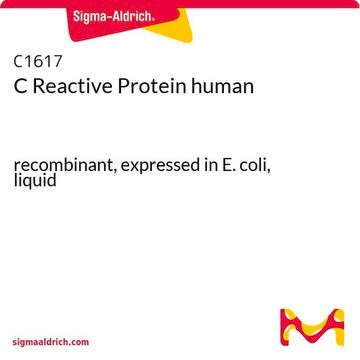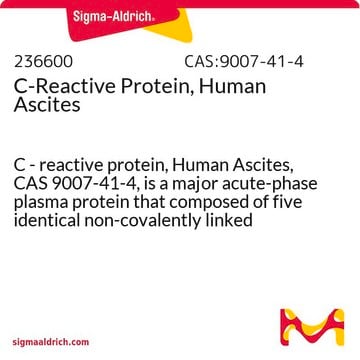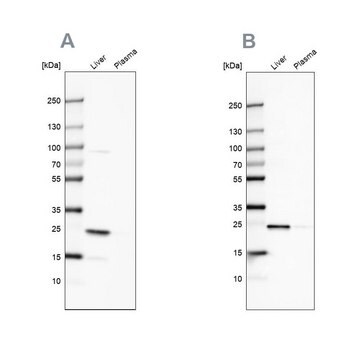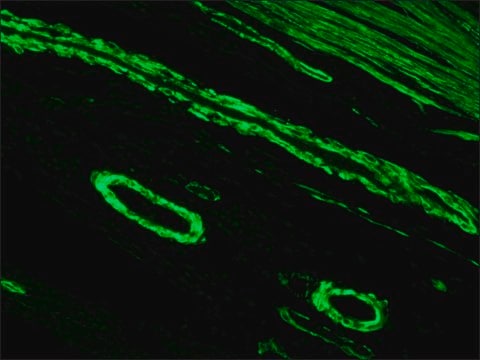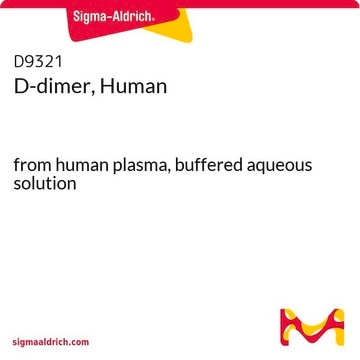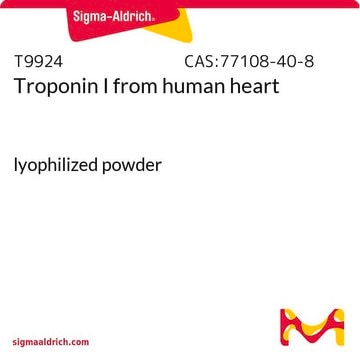C4063
C Reactive Protein from human fluids
buffered aqueous solution
Iniciar sesiónpara Ver la Fijación de precios por contrato y de la organización
About This Item
Productos recomendados
origen biológico
human fluids
Análisis
≥90% (SDS-GE)
formulario
buffered aqueous solution
Nº de acceso UniProt
aplicaciones
cell analysis
temp. de almacenamiento
2-8°C
Información sobre el gen
human ... CRP(1401)
¿Está buscando productos similares? Visita Guía de comparación de productos
Descripción general
C Reactive Protein (CRP) is a homopentameric protein, which belongs to the pentraxin family. It is produced in liver hepatocytes, smooth muscle cells, macrophages and adipocytes. CRP gene is located on human chromosome 1q23.2.
Aplicación
C Reactive Protein from human fluids has been used:
- to investigate the neutrophil extracellular traps (NETs)-dependent generation of monomeric CRP (mCRP) from pentameric CRP (pCRP)
- to evaluate its effects on areas at risk (AAR) of myocardium with ischemia-reperfusion injury
- to measure intracellular levels of reactive oxygen species (ROS)
Acciones bioquímicas o fisiológicas
C Reactive Protein (CRP) plays a critical role in apoptosis, phagocytosis, nitric oxide (NO) release and the secretion of cytokines, such as interleukin-6 and tumor necrosis factor-α. CRP acts as a marker for cardiovascular diseases, rheumatoid arthritis and cancer.
C reactive protein (CRP) is an acute phase protein. Serum levels in patients with atherosclerosis is predictive of increased risk of myocardial infarction (MI) and stroke. The cytokine IL-6 is thought to be the key mediator in hepatocyte secretion of acute phase proteins including CRP. CRP mediates innate immunity by binding to microbial polysaccharides and to ligands exposed on damaged cells. The binding activates the classical complement pathway (C1, C4, C2, C3 but not C5-9). Opsonization of the substrates leads to their uptake by phagocytic cells and limits the inflammatory response.
C reactive protein (CRP) is an acute phase protein. Serum levels in patients with atherosclerosis is predictive of increased risk of myocardial infarction (MI) and stroke. The cytokine IL-6 is thought to be the key mediator in hepatocyte secretion of acute phase proteins including CRP. CRP mediates innate immunity by binding to microbial polysaccharides and to ligands exposed on damaged cells. The binding activates the classical complement pathway (C1, C4, C2, C3 but not C5-9). Opsonization of the substrates leads to their uptake by phagocytic cells and limits the inflammatory response.
Envase
Package size based on protein content.
Otras notas
CRP is isolated from human fluids (Ascitic/Pleural).
Forma física
Solution in 0.02 M Tris, 0.28 M sodium chloride, 0.005 M calcium chloride, pH 7.8 - 8.2, containing 0.1% sodium azide.
Nota de análisis
Protein determined by Lowry.
Cláusula de descargo de responsabilidad
RESEARCH USE ONLY. This product is regulated in France when intended to be used for scientific purposes, including for import and export activities (Article L 1211-1 paragraph 2 of the Public Health Code). The purchaser (i.e. enduser) is required to obtain an import authorization from the France Ministry of Research referred in the Article L1245-5-1 II. of Public Health Code. By ordering this product, you are confirming that you have obtained the proper import authorization.
Código de clase de almacenamiento
10 - Combustible liquids
Clase de riesgo para el agua (WGK)
WGK 3
Punto de inflamabilidad (°F)
Not applicable
Punto de inflamabilidad (°C)
Not applicable
Certificados de análisis (COA)
Busque Certificados de análisis (COA) introduciendo el número de lote del producto. Los números de lote se encuentran en la etiqueta del producto después de las palabras «Lot» o «Batch»
¿Ya tiene este producto?
Encuentre la documentación para los productos que ha comprado recientemente en la Biblioteca de documentos.
Los clientes también vieron
Acute osteomyelitis in children.
Heikki Peltola et al.
The New England journal of medicine, 370(4), 352-360 (2014-01-24)
C-reactive protein promotes atherosclerosis by increasing LDL transcytosis across endothelial cells
Bian F, et al.
British Journal of Pharmacology, 171(10), 2671-2684 (2014)
Yoshiko Fujita et al.
Clinical chemistry, 55(2), 285-294 (2008-12-17)
C-reactive protein (CRP) exerts biological activity on vascular endothelial cells. This activity may promote atherothrombosis, but the effects of this activity are still controversial. Lectin-like oxidized LDL receptor-1 (LOX-1), the oxidized LDL receptor on endothelial cells, is involved in endothelial
Alice S Ryan et al.
Journal of the American Geriatrics Society, 62(4), 607-614 (2014-03-19)
To examine the relationships between plasma and tissue markers of systemic and vascular inflammation and obesity and insulin resistance and determine the effects of aerobic exercise training plus weight loss (AEX+WL) and weight loss (WL) alone on these biomarkers. Prospective
Sofia Ramiro et al.
Annals of the rheumatic diseases, 73(8), 1455-1461 (2014-05-09)
To analyse the long-term relationship between disease activity and radiographic damage in the spine in patients with ankylosing spondylitis (AS). Patients from the Outcome in AS International Study (OASIS) were followed up for 12 years, with 2-yearly clinical and radiographic assessments.
Nuestro equipo de científicos tiene experiencia en todas las áreas de investigación: Ciencias de la vida, Ciencia de los materiales, Síntesis química, Cromatografía, Analítica y muchas otras.
Póngase en contacto con el Servicio técnico
